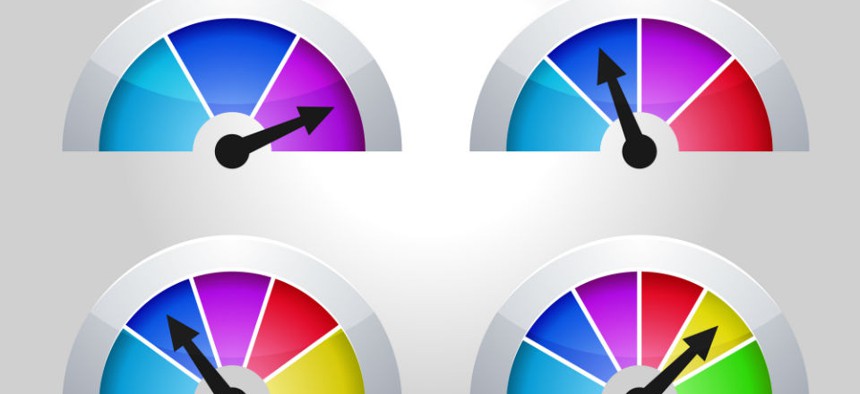
In-Finity/Shutterstock.com
Avoid Getting Caught in the Quagmire of Key Performance Indicators
Searching for the ‘best KPI’ is just another substitute for thinking.
Does your organization need some key performance indicators? Do not worry. To your rescue come organizations and books. And do they have KPIs for you.
For example, the KPI gurus at Actuate Corp. have created—just for you—a free KPI library containing over 650 KPIs. What more could you ask for?
Well, if you weren’t satisfied, you could go to ServiceNow’s KPILibrary. It offers a database containing “6,500+ KPI templates and examples.” What more could you ask for?
If that isn’t enough, you could go to the KPI Mega Library, with its 17,000 KPIs.
If you don’t want to wade through 17,000 KPIs, or 6,500, or even a mere 650, you could choose to limit yourself to Actuate’s Top 75 KPIs.
Bernard Marr has a book on them: Key Performance Indicators: The 75 measures every manager needs to know.
And because reading these 376 pages will consume too much of your valuable time, you might want to check Marr’s two other books: 25 Need-To-Know Key Performance Indicators and Key Performance Indicators for Dummies.
If, however, you want to limit your KPI consumption even more, you look at Six Figure Management Method: How to Grow Your Business With the Only Six KPIs You’ll Ever Need. Wow, just six, covered in just 256 pages.
Of course, you’re not trying to grow a business. You’re in the public sector trying to provide services to citizens. Do not fear. David Parmenter, has published Key Performance Indicators for Government and Non Profit Agencies: Implementing Winning KPIs (which includes 18 pages of KPIs).
Still, this might be a little too generic for your organization. If so, you might want to check out the publications from the KPI Institute based in Melbourne. It’s store let’s you “shop by industry”—such as “Government—Local” and “Government—State/Federal.”
Here you can find the Top 25 Local Government KPIs of 2011-2012 and also the Top 25 State Government KPIs of 2011-2012.
But why are (or might) these 17,000, or 6,500, or 650, or 75, or even 25 (Top or Need-To-Know) KPIs relevant to any specific organization? These KPIs are generic—generally useful for lots of organizations, and thus not precisely applicable to any specific one. How do (or might) any of them help the leadership team of a public organization decide what purpose to pursue? After all, every leadership team has to always start with purpose. No leadership team can decide what to measure until its members have decided what they should try to accomplish.
Then, once the team has focused on a purpose, how do (or might) any of these KPIs help it identify its key performance deficits? Sure, in the list of 17,000 KPIs there might be one that is precisely relevant—a KPI that captures an important barrier that the organization faces as it tries to improve performance. But how would the team find this magic needle in amongst the other 16,999 strands of hay?
And even if the leadership team found a KPI from one of these libraries that precisely captured the performance deficit on which it wanted to focus, how does this help the team decide what target to create for eliminating (or at least mitigating) this performance deficit?
Finally, will this magic KPI also be useful in motivating the organization’s staff and collaborators? Will it get everyone focused on achieving the target set for fixing this performance deficit and thus improve performance? Or will this KPI merely redirect their energies in an irrelevant (or even counterproductive) direction?
The problem with generic performance measures—indeed, the problem with any generic anything—is that it isn’t quite right. It might be close, maybe even close enough for a first-cut effort. But the danger of generic measures is that they can lull a manager into a nonthinking (yet self-congratulatory) complacency. “Wow! I’m using the best KPIs available. Can’t do better than that.”
It’s similar to the best-practice obsession. Why invent your own approach, when someone else has created a best practice (which has been certified as an official best practice by the International Center for Best Practice?) I can’t be smarter than those guys, so why bother? Why bother thinking?
Indeed, the search for a “best practice” is a substitute for thinking. Similarly, the search for a “best KPI” is just another substitute for thinking.
Selecting KPIs—deciding what to measure (and, of course, why)—is a leadership responsibility. It can’t be delegated to some database—no matter how large, no matter how brilliantly constructed. If the chief executive delegates this task, he or she is simultaneously delegating responsibility for leading the organization.
Robert D. Behn, a lecturer at Harvard University's John F. Kennedy School of Government, chairs the executive education program Driving Government Performance: Leadership Strategies that Produce Results. His book, The PerformanceStat Potential, was recently published by Brookings.
Copyright 2014 Robert D. Behn
(Image via In-Finity/Shutterstock.com)






